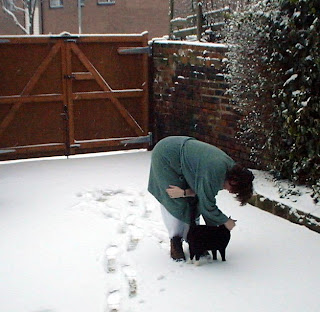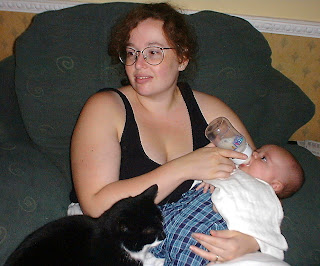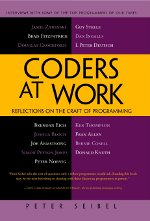
User BobH asked
on StackOverflow about accelerating path-dependent loops. He provided a simple example in which a vector gets filled conditional on the value of
the preceding element. Simple to code, but hard to vectorise.
By the time I saw that question yesterday evening,
Josh Ulrich had already posted a nice answer suggesting
to switch from
ifelse to
if to escape the overhead of a vectorised expression on simple scalars. I meekly added a comment
suggesting that
Rcpp would likely do well on this and that
someone should volunteer
such an answer. Well, it is still August and Mr. Someone is on holiday, so this morning I followed up with such an answer. And as it turns out to
work quite well indeed, we will repost it here.
Let's start with the general setup, and the two functions supplied by Josh. We also byte-compile these using the
compiler package which
is the culmination of several years of work by R core member
Luke Tierney. This package was added to R
during the last major release, and we assessed it
in this earlier blog post as well as several Rcpp-related
follow-ups. We also load the packages for on-the-fly 'inline' compilation and easy benchmarking:
library(inline)
library(rbenchmark)
library(compiler)
fun1 <- function(z)
for(i in 2:NROW(z))
z[i] <- ifelse(z[i-1]==1, 1, 0)
z
fun1c <- cmpfun(fun1)
fun2 <- function(z)
for(i in 2:NROW(z))
z[i] <- if(z[i-1]==1) 1 else 0
z
fun2c <- cmpfun(fun2)
We see that basic worker just assign to the
i-th element based on the preceding element. Function two uses the aforementioned
if statement, and both are also byte-compiled.
Writing the same code in C++ using both
Rcpp (for the R/C++ integration) and
inline for the on-the-fly compilation, linking and loading of C++ code into R is pretty
straightforward too:
funRcpp <- cxxfunction(signature(zs="numeric"), plugin="Rcpp", body="
Rcpp::NumericVector z = Rcpp::NumericVector(zs);
int n = z.size();
for (int i=1; i<n; i++)
z[i] = (z[i-1]==1.0 ? 1.0 : 0.0);
return(z);
")
This single R function call takes the code embedded in the argument to the
body variable, builds a complete function in temporary file,
and then compiles, links and loads it. We can now call
funRcpp() just like the other four functions and do so via the
benchmark() function of the
rbenchmark package.
R> z <- rep(c(1,1,0,0,0,0), 100)
R> identical(fun1(z),fun2(z),fun1c(z),fun2c(z),funRcpp(z))
[1] TRUE
R>
R> res <- benchmark(fun1(z), fun2(z),
+ fun1c(z), fun2c(z),
+ funRcpp(z),
+ columns=c("test", "replications", "elapsed", "relative", "user.self", "sys.self"),
+ order="relative",
+ replications=1000)
R> print(res)
test replications elapsed relative user.self sys.self
5 funRcpp(z) 1000 0.005 1.0 0.01 0
4 fun2c(z) 1000 0.482 96.4 0.48 0
2 fun2(z) 1000 1.989 397.8 1.98 0
3 fun1c(z) 1000 11.365 2273.0 11.37 0
1 fun1(z) 1000 13.210 2642.0 13.21 0
We can focus on the columns labelled
elapsed and
relative. The C++ version is faster by a factor of almost one-hundred compared to
the byte-compiled version of funtion2, and almost four-hundred times faster than the plain-R variant of function2. And function1 is even worse,
coming at well over twenty-two-hundred times the run-time of the C++ version. Byte-compilation also helps little here.
For comparison, we also ran the original example of a very short vector, called more frequently:
R> z <- c(1,1,0,0,0,0)
R> res2 <- benchmark(fun1(z), fun2(z),
+ fun1c(z), fun2c(z),
+ funRcpp(z),
+ columns=c("test", "replications", "elapsed", "relative", "user.self", "sys.self"),
+ order="relative",
+ replications=10000)
R> print(res2)
test replications elapsed relative user.self sys.self
5 funRcpp(z) 10000 0.047 1.00000 0.04 0
4 fun2c(z) 10000 0.134 2.85106 0.13 0
2 fun2(z) 10000 0.328 6.97872 0.32 0
3 fun1c(z) 10000 1.080 22.97872 1.08 0
1 fun1(z) 10000 1.243 26.44681 1.24 0
The qualitative ranking is unchanged: the
Rcpp version dominates. Function2 using
if instead of the vectorised
ifelse is second-best with the byte-compiled version being about twice as fast that the plain R
variant, but still almost three times slower than the C++ version. And the relative differences are less pronounced: relatively speaking, the
function call overhead matters less here and the actual looping matters more: C++ gets a bigger advantage on the actual loop operations in the longer
vectors. That it is an important result as it suggests that on more real-life sized data, the compiled version may reap a larger benefit.
All in all a nice demonstration of
Rcpp, and a gain of almost one-hundred to the best
byte-compiled version is nothing to sneeze at---especially when it is so easy to write and load a five-line C++ function thanks to
Rcpp.
Before closing, a quick reminder that I will giving two classes on
Rcpp in a few weeks. These will be in New York on September 24, and San Franciso on October 8, see
this blog post as well as
this page at Revolution Analytics (who are a
co-organiser of the classes) for details and registration information.
 The text below just went out to r-sig-finance
along with updates to the R/Finance website and
its Call for Papers page.
The text below just went out to r-sig-finance
along with updates to the R/Finance website and
its Call for Papers page.
 I'm not very good with dates. For the last two years now, Joshua's anniversary
has snuck up on me and caught me by surprise.
I don't think that I'd really appreciated until this year that we lost him on
the Labor Day long weekend. I'll have to remember that for next year so I don't
forget.
I don't know what my problem was this year. I just didn't realise that it
was this early in September that we lost him. Last year I was just too
exhausted from dealing with a new baby to realise when his anniversary was,
and I felt terrible for missing it.
This year, I just felt terrible for not realising when it was, but at least
Sarah pointed it out before the fact.
For added irony, the 4th of September this year is Father's Day in Australia.
Yesterday, I was looking at photos of Joshua to remember him, and
I'm not very good with dates. For the last two years now, Joshua's anniversary
has snuck up on me and caught me by surprise.
I don't think that I'd really appreciated until this year that we lost him on
the Labor Day long weekend. I'll have to remember that for next year so I don't
forget.
I don't know what my problem was this year. I just didn't realise that it
was this early in September that we lost him. Last year I was just too
exhausted from dealing with a new baby to realise when his anniversary was,
and I felt terrible for missing it.
This year, I just felt terrible for not realising when it was, but at least
Sarah pointed it out before the fact.
For added irony, the 4th of September this year is Father's Day in Australia.
Yesterday, I was looking at photos of Joshua to remember him, and  Update: Despite another email yesterday reasserting the 90-120 days lie, the source code has now landed on
Update: Despite another email yesterday reasserting the 90-120 days lie, the source code has now landed on 





 As
As  As I
As I  On the train to my parents' house for Christmas I finished up a wild run
through the book
On the train to my parents' house for Christmas I finished up a wild run
through the book  The book is a collection of interviews with 15 great programmers of our time,
starting with Jamie Zawinsky and ending with Donald Knuth. It's written in an
interview style each interview starts with a brief introduction to the
person being interviewed, summarizing what the person is known for and what he
or she has accomplished and a few of the highlights of the interview, and then
a transcript of the interview follows, with the author/editor, Peter Siebel,
will saying something or asking a question, and the interviewee responding. I
was skeptical about this format at first because I feel like it can be an easy
way out of good editing and make the reader have to do the work of the editor,
but on finishing I think that Siebel uses the format to his advantage in this
case.
For one, the speech format allows the reader to really form a picture of how
the person being interviewed speaks and would act in a conversation. Jamie is
somewhat bitter and pretty informal. Brad Fitzpatrick is flippant and
energetic, his speech littered with profanity and colloquialisms. Others seem
more stately and verbose Joe Armstrong's responses can go on for a page or
more. In this way, not only do readers learn something about what these greats
have learned about programming, but we also feel a bit more like we've met or
know them, and can connect to them more as people.
I always have this problem where I want to read computer books, but often
computer books seem inextricably tied to the computer, so there's this dynamic
of reading a bit and then wanting to get on a machine and try something out,
write some code, play around especially with books focused on a specific
language. Coders at Work retains some of this computer-book dynamic in that I
constantly encountered things that I want to investigate or play around with
more: Erlang, OCaml, various papers and essays, Knuth's literate programs, and
books such as Higher Order Perl and others. Siebel makes a point to ask each
person what her short-list of books and papers programmers should read are, so
this book is a great source of pointers to other reading material. Unlike a
more specific book, however, keeping a list in a notebook was enough to settle
the mind to read away-from-a-computer for chapters at a time.
It's obvious that despite the interview format, Siebel has done some serious
editing. None of the prose is boring to read, and I can't imagine that the text
is a straight transcript of how the interviews went. He also has arranged the
interviews in an order such that different interviews play off each other. In
Branden Eich's interview, for example, he disparages the book
Design Patterns:
The book is a collection of interviews with 15 great programmers of our time,
starting with Jamie Zawinsky and ending with Donald Knuth. It's written in an
interview style each interview starts with a brief introduction to the
person being interviewed, summarizing what the person is known for and what he
or she has accomplished and a few of the highlights of the interview, and then
a transcript of the interview follows, with the author/editor, Peter Siebel,
will saying something or asking a question, and the interviewee responding. I
was skeptical about this format at first because I feel like it can be an easy
way out of good editing and make the reader have to do the work of the editor,
but on finishing I think that Siebel uses the format to his advantage in this
case.
For one, the speech format allows the reader to really form a picture of how
the person being interviewed speaks and would act in a conversation. Jamie is
somewhat bitter and pretty informal. Brad Fitzpatrick is flippant and
energetic, his speech littered with profanity and colloquialisms. Others seem
more stately and verbose Joe Armstrong's responses can go on for a page or
more. In this way, not only do readers learn something about what these greats
have learned about programming, but we also feel a bit more like we've met or
know them, and can connect to them more as people.
I always have this problem where I want to read computer books, but often
computer books seem inextricably tied to the computer, so there's this dynamic
of reading a bit and then wanting to get on a machine and try something out,
write some code, play around especially with books focused on a specific
language. Coders at Work retains some of this computer-book dynamic in that I
constantly encountered things that I want to investigate or play around with
more: Erlang, OCaml, various papers and essays, Knuth's literate programs, and
books such as Higher Order Perl and others. Siebel makes a point to ask each
person what her short-list of books and papers programmers should read are, so
this book is a great source of pointers to other reading material. Unlike a
more specific book, however, keeping a list in a notebook was enough to settle
the mind to read away-from-a-computer for chapters at a time.
It's obvious that despite the interview format, Siebel has done some serious
editing. None of the prose is boring to read, and I can't imagine that the text
is a straight transcript of how the interviews went. He also has arranged the
interviews in an order such that different interviews play off each other. In
Branden Eich's interview, for example, he disparages the book
Design Patterns: